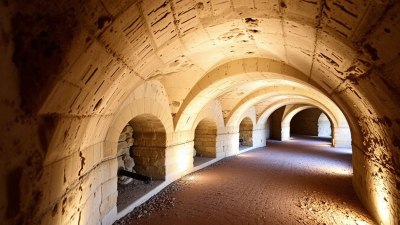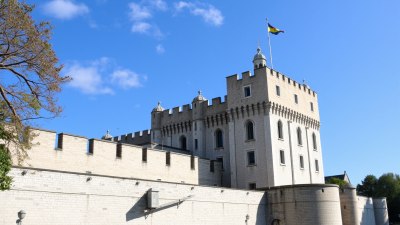Aarhus's Viking History: Exploring Denmark's Past
Delve into Aarhus's Viking heritage and discover Denmark's rich historical tapestry.

Image created with Flux Schnell
Aarhus, Denmark's second-largest city, is not only a hub of modernity but also a gateway into the fascinating world of Viking history. Nestled in the heart of the Jutland peninsula, Aarhus has played a significant role in Denmark's past, especially during the Viking Age. From ancient settlements to modern archaeological sites, the legacy of the Vikings is deeply intertwined with the city’s identity. This article navigates through the Viking history associated with Aarhus, revealing how these seafaring Norsemen shaped the region's culture, economy, and society.
The Vikings: Who Were They?
The Vikings emerged from Scandinavia during the late 8th to the early 11th centuries, renowned for their seafaring exploits, trading networks, and fierce raids. Originating primarily from what we now know as Norway, Sweden, and Denmark, they left an indelible mark on Europe through their voyages that spanned from the British Isles to the shores of North America. The term 'Viking' refers to their acts of exploration and raiding rather than a distinct ethnic group.
Aarhus: A Key Location in Viking Denmark
Aarhus's strategic location on the east coast of Jutland made it an ideal settlement for the Vikings. Established as a trading post around the year 770 AD, it thrived as a center for commerce and interactions with other cultures. The city’s name is derived from the old Danish word 'a', meaning river, and 'hus', meaning house or residence, indicating its origins as a trading site near waterways.
The Early Settlements
The early Viking settlements in Aarhus were primarily composed of wooden longhouses, which housed families and livestock under one roof. Archaeological findings, including remnants of these longhouses, suggest that the Viking community was organized and skilled in agriculture, fishing, and craftsmanship. They engaged in trade with neighboring settlements and distant lands, exchanging goods such as furs, timber, iron, and textiles.
The Role of Religion and Mythology
Religion played a crucial role in Viking society, and Aarhus was no exception. The Vikings practiced a polytheistic faith centered around gods like Odin, Thor, and Freyja. Temples and sacred groves dedicated to these deities were common within Viking society, serving as places for worship and communal gatherings. The mythology influenced their daily lives, instilling a sense of identity and belonging in the community.
Aarhus in the Viking Age
During the Viking Age, Aarhus became an important point of convergence for trade routes leading across Scandinavia and beyond. As trade expanded, so did the city. Discoveries of silver coin hoards and artifacts within the region highlight Aarhus's role in the wider economic network of the Viking world. Items unearthed include intricate jewelry, weapons, and tools, many of which illustrate the merging of Scandinavian customs with those of their trading partners.
Significant Archaeological Finds
Modern-day excavations in Aarhus have unveiled a wealth of artifacts, shedding light on the lifestyle and activities of the Vikings. The Moesgaard Museum, located just south of Aarhus, plays a key role in showcasing these discoveries. The museum hosts numerous exhibitions dedicated to the Viking Age, featuring significant finds such as the well-preserved remains of ships, burial mounds, and tools that provide insight into the daily lives of the Vikings.
Cultural Influence of the Vikings
The impact of the Vikings extended far beyond their own era. Their explorations and settlements influenced the development of language, culture, and even governance in Denmark and across Europe. The legacy of Viking art and storytelling, characterized by intricate designs and epic sagas, continues to resonate in contemporary Danish culture. Festivals celebrating Viking heritage are held annually, attracting thousands who share in the nostalgia of their illustrious past.
Aarhus's Modern Connection to its Viking Roots
Todays Aarhus honors its Viking history through various cultural initiatives. The city embraces its heritage while promoting modern arts and innovation. Events such as the Viking Market, where reenactors showcase traditional crafts, combat demonstrations, and culinary delights, forge a connection between past and present, inviting locals and tourists alike to engage with history in an interactive manner. The city's commitment to preserving its history is evident in its public programs that educate people about Viking traditions and their relevance in today’s context.
Viking Festivals and Events
Throughout the year, Aarhus hosts several Viking festivals that celebrate its rich cultural heritage. These events typically feature reenactments, marketplaces with handmade goods, traditional music, and workshops aimed at both children and adults. The highlight of these festivals often includes vibrant displays of Viking dances, storytelling sessions, and interactive experiences that immerse visitors in the Viking way of life, ensuring that the history remains alive for future generations.
Education and Research on Viking History
Research institutions in Aarhus actively study Viking history, fostering a deeper understanding of their impact. Collaborations between universities, museums, and cultural organizations aim to discover more about the social structures, trade routes, and maritime innovations of the Vikings. Educational programs designed for schools help instill an appreciation for history in younger generations, ensuring that the stories of Aarhus’s Viking past are passed down with pride.
The Viking Legacy Today
The legacy of the Vikings lives on in Aarhus, with the city embracing its past while looking to the future. The blending of ancient and modern within Aarhus is a reflection of Denmark's evolution as a nation. The Vikings have become symbolic not only of the fierce warriors and skilled traders they were but also of cultural innovation and adaptability. There’s much to learn from their values of exploration, community, and resilience in today’s rapidly changing world.
Continuing the Journey
For those interested in exploring Aarhus’s Viking history, various resources are available. Museums, guided tours, and literature provide ample opportunities to delve deeper into the Viking heritage of this remarkable city. Travelers can also engage with local guides who share stories and insights that bring the Viking Age to life, transforming mere historical facts into vivid narratives that echo through time.
Aarhus stands today as a testament to the enduring legacy of the Vikings. The city’s rich historical tapestry woven through centuries of change reflects an intrinsic connection to its Viking past. Through continuous education, cultural celebrations, and archaeological exploration, Aarhus promises that its Viking history will not only be remembered but will thrive amidst the challenges of modern life. As a city deeply rooted in its heritage, Aarhus invites both residents and visitors alike to discover the intriguing mysteries of the Viking Age, ensuring that Denmark's past remains a vibrant part of its future.











